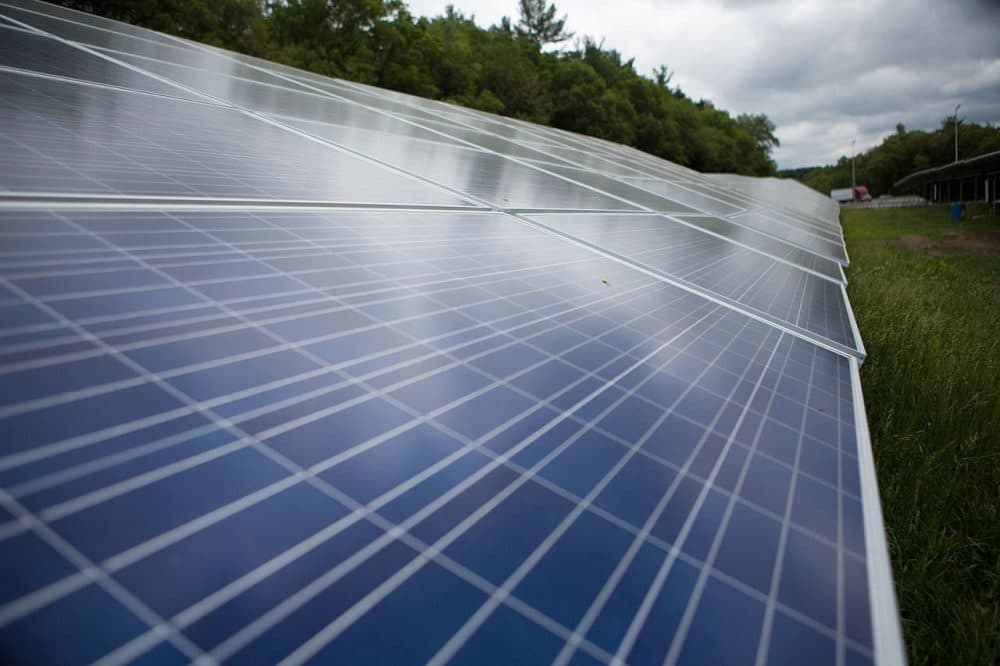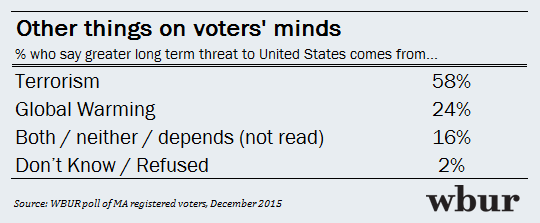Advertisement
Polling Shows Little Urgency From Mass. Voters On Climate Change

Paris has been in the news for two reasons in the past month -- but only one has really broken through with voters here in Massachusetts.
According to our recent WBUR poll, more than three-fifths (62 percent) of voters say they have been following the news about the terrorist attacks in Paris “very closely." Only 19 percent say the same about the international climate change summit currently underway in the city.
This is not new. It fits into a larger pattern among Massachusetts voters of casual disconnectedness toward climate change, a trend we have been tracking since 2011. Most people in the state believe climate change is already happening and is caused at least partly by human activity. Most people anticipate fairly nasty consequences if it is not addressed. On each of these measures, opinion has moved very little since 2011.
But Bay Staters show no signs of changing their own behavior in response, or demanding action from their elected leaders. Global warming consistently ranks at or near the bottom of voters' priorities, an ordering that is largely unaffected by how the question is posed. And they place it at the bottom of the list for the issues on which they want action from state government.
A 2014 national poll found that climate change does not even rise to the top of environmental priorities, which collectively tend to rate far lower than perennial top concerns like the economy, health care and education.

More than twice as many voters in the recent WBUR poll said terrorism was the bigger long-term threat than chose global warming. This preference reflects the consistent low priority voters give climate change as much as it does the prevalence of terror in the news cycle.
- Voters support climate policies, but how hard will they push for them?
That is not to say that the public doesn’t support action on climate change. In the WBUR poll, 55 percent said they approve of the Obama administration’s efforts to regulate greenhouse gases emitted by power plants. Nationally, even more Americans supported the idea last year, when the policy was first announced. And majorities support the U.S. leading and signing onto an international agreement to fight climate change.
A poll of Massachusetts residents last year found strong support for a variety of policies to combat and prepare for the effects of climate change. More than 60 percent “strongly supported” increasing energy efficiency standards and updating the electric grid to carry more renewable power. Even ideas that would spend public money, like creating incentives for ratepayers to generate their own renewable power and investing in public transit, pulled majority support. And two-thirds strongly support flood-proofing key infrastructure to prepare for the effects of climate change.
Advertisement
These levels of support are much higher than residents' willingness to change their own lifestyles to fight climate change. Throughout our polling since 2011, we have seen no evidence of a link between believing the earth is warming and changing personal behavior. People who say man-made climate change is real are no more or less likely to save energy or reduce emissions than people who do not. They are more likely to plan to reduce their carbon footprint, but when it comes to actual behavior, there is no difference.
Of course, there are plenty other reasons for most carbon-saving behaviors. Energy costs money. Using less of it costs less money. And time and again, the public ranks pollution higher than global warming as a concern. When the Obama administration first pitched its greenhouse gas regulations on power plants, it talked more about public health problems like asthma than about climate change. Tapping into these more proximate and concrete concerns and motives may be more effective at changing behavior than browbeating residents over global warming.
- Voters ahead of Beacon Hill on solar
As international negotiators seek to iron out the details of the Paris climate accord, there has been less progress in Massachusetts. Here, lawmakers have so far failed to strike a deal to increase the cap on so-called “net metering,” the policy that lets consumers get credit on their electric bills for power they generate from solar panels on their property. Meanwhile, Gov. Charlie Baker has proposed increasing the amount of hydroelectric power the state buys from Canada, the Pilgrim nuclear power plant is slated to close, and energy company Kinder Morgan wants to build a new natural gas pipeline across parts of the state.
As 2016 is shaping up to be a big year for energy policy in Massachusetts, lawmakers may take note that their constituents have a very clear preference for renewable energy.
In our recent WBUR poll and in previous surveys, the public has repeatedly put solar and wind at the very top of the list of their preferred energy mix, with coal and oil at the bottom. It would be hard to find an issue with more universal support than increasing the state’s reliance on solar energy. Over and over again, it is the runaway favorite energy source.

While solar energy shines, natural gas has been leaking support over the last few years. In 2011, 66 percent of registered voters said Massachusetts should rely more on natural gas going forward. This has dropped to 50 percent. And support for the Kinder Morgan pipeline -- key to boosting the state’s capacity to bring in natural gas — has dropped from a 2 to 1 margin in support, in 2014, to barely even today. When voters were told that the pipeline would carry gas mined via hydraulic fracturing, or “fracking," just 38 percent were in favor of the idea.
And voters say they are willing to put their money on the line for their preferences. A majority (58 percent) would pay $10 a month more for energy if doing so would reduce greenhouse gases. This is very close to the share we found in our 2014 poll, where we also tested amounts of $5 and $20 more a month.
Of course, climate change is not the only reason for supporting renewable power. Some may want to wean the U.S. off foreign oil for national security reasons, while others may want to reduce air pollution or lessen the environmental impact of mining for fossil fuels. Some may see opportunity in developing a green economy, although fewer voters think fighting climate change would help the state’s economy than did in 2011. But whatever the reason, the carbon reductions from pursuing renewable energy are the same.
The question is whether lawmakers will take notice without a clear mandate from voters. It seems unlikely there will be pitchfork- and torch-wielding mobs on the steps of the State House if little or nothing is done.
Voters don’t deny that climate change is happening, but they do seem to be in a state of denial about the level of priority and action most experts think will be needed to tackle the problem.
Steve Koczela is president of the MassINC Polling Group, and Rich Parr is research director there. They are regular contributors to WBUR Politicker.